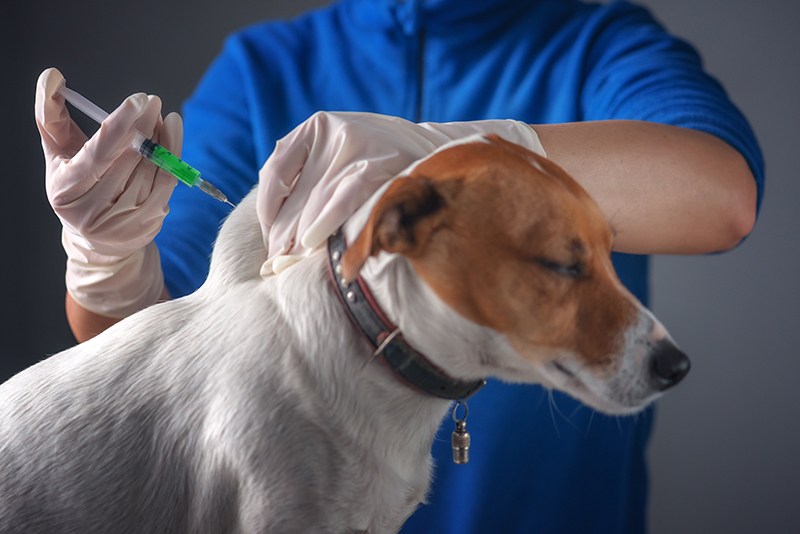Routine Vet Care & Pet Wellness
Vaccinations
Vaccinations play a large part in keeping your pet healthy and free from disease. Our veterinarians tailor a vaccine protocol to your pet based on his or her lifestyle and recommendations from the American Veterinary Medical Association.
Core vaccines for dogs and cats include: Distemper and Rabies.
Non-core vaccines for dogs include: Lyme, Leptospirosis, Canine Influenza and Bordetella
Bordetella (B. bronchiseptica) is a bacteria commonly associated with respiratory infections in dogs. It is one of the more common bacterial causes of canine infectious tracheobronchitis – also known as canine cough. The vaccine is strongly recommended if your dog attends day care, visits dog parks, boarding kennels or any other location where he/she comes into contact with other dogs. Bordetella is highly contagious, easily transmitted through the air or direct contact, and fairly resistant to destruction in the environment.
Lyme disease is transmitted to pets through the bite of a tick and can cause lameness, swollen joints, and fever. Ticks are found in grassy, wooded, and sandy areas and prevention is important. Ask one of our veterinarians about vaccinating your pet and/or preventive products that we recommend.
Leptospirosis is a disease caused by infection of Leptospira bacteria. These bacteria can be found worldwide in soil and water. Leptospirosis can be spread from animals to people. Common risk factors are drinking from contaminated rivers, lakes or streams. Also, exposure to wildlife urine if contaminated with Leptospira bacteria.
Canine Influenza virus is spread through direct contact, coughing/barking/sneezing and contaminated objects. Symptoms range from mild to severe: coughing, sneezing, nasal/eye discharge, lethargy, reduced appetite and fever.
Non-core vaccines for cats include: Feline Leukemia (Felv)
Feline leukemia is a viral infection transmitted from one cat to another through close contact. This vaccine is highly recommended for cats the first year of life and those that go outdoors or live in multi-cat households.

Heart worm testing and Parasite Prevention
Dangerous parasites are always present in the environment. We recommend regular fecal checks and annual testing for Heartworm as the best way to prevent parasitic disease and the transmission of intestinal parasites to your pet and your family.
External Parasites (fleas, ticks) and internal Parasites (heartworm, hookworm, roundworm) can cause problems for your pet and your family. Prevention is the best approach to eliminating these pests. Please ask a staff member at Vet Partners Pet Hospital for the best way to prevent parasite problems in your pet.
Vet Partners Pet Hospital carries a variety of topical, oral, or injectable flea/tick and heartworm preventatives.

Nutrition
Proper diet and nutrition can help your pet fight against disease, maintain a proper weight, and promote the overall well-being of your pet. Maintaining a healthy body weight is a very important aspect of a pet’s overall physical health. Good nutrition can help provide your pet with a happier, safer, and longer life. With proper diet and exercise, all pets should be able to meet their dietary needs and be within a healthy weight range. The best way to make sure your pet’s needs are being met is to consult with us about a specific diet for your pet and their lifestyle. Our staff will help your pet battle unhealthy weight gain and counsel you on the best nutritional options available.

Behavior Counseling
Vet Partners Pet Hospital recognizes that well-socialized animals live more peaceful, relaxed, and healthy lives. We utilize both behavior modification programs and the use of prescription medications in order to help with behavioral problems. We also work closely with veterinary behavioral specialists in the Twin Cities if we feel a particular case is beyond our skill level. Please call to schedule an appointment and consultation with one of our veterinarians.

